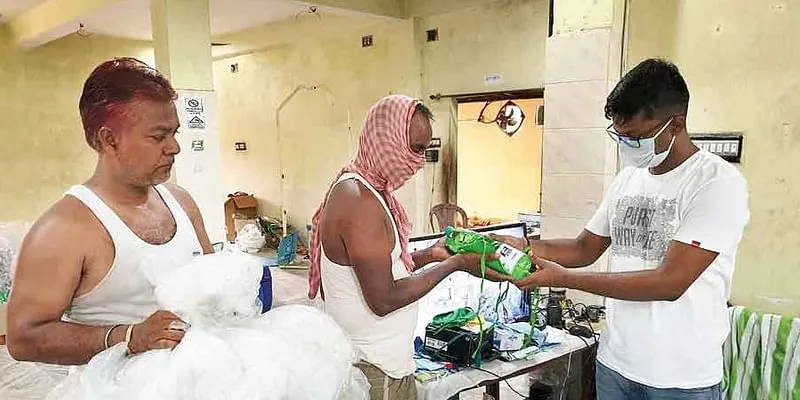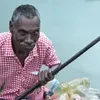In a barter system initiative, this club in West Bengal offers masks and sanitisers in exchange for used plastic and plants
To help the poor families with hygiene essentials during the pandemic, the Palla Road Palli Mangal Samity in East Burdwan exchanges plants and plastics for masks and sanitisers.
The need for hygiene essentials is increasing across the country, but the cost of these items makes many think hard about choosing between a sanitiser or their next meal.
To address this need and help the underprivileged in West Bengal, Palla Road Palli Mangal Samity, a local club in East Burdwan, has come up with a barter system that takes waste plastics and plants and offers masks and sanitisers in return.

Exchanging plastic and plants for sanitisers (Image: India Today)
Anyone in need for one litre of sanitiser and two cloth masks every month, can exchange five plants or five kilos of plastic, including discarded bottles. This initiative is open to anyone across the state and can be claimed once a month, until the pandemic is over.
"The main aim is to strive towards an eco-friendly world and also make it COVID-19 free at the same time. Our target is to distribute sanitisers and masks to 100 people every day, and we are getting a very good response,” Sandipan Sarkar, the general secretary of the Samity told India Today.
“Eco brick is made from plastic deposited in the bank. Plants are also planted along the river banks and on roadsides. People who are neither able to bring in plants nor plastic can buy them for Rs 49, and this offer is only available for a month," he added.
Most of the people who approach the Samity are from poor families who cannot afford to buy sanitisers, while the rest of them are from middle-class families. The families in need of these essentials have been registered and only one member from each is allowed to collect the essentials.
The sanitiser is made with 80 percent alcohol, hydrogen peroxide, glycerine and water and goes through a microbiology and chemical test before finally being distributed.
Swapan Brahma, an electrician who is facing a financial crunch ever since the lockdown was declared in March, went with 5kg of used plastic recently to the Samiti and got masks and sanitiser in return.
“I can’t afford to buy sanitiser from the market; one small bottle costs around Rs 50. When I came to know about the initiative, I collected used plastics from my home and from my neighbours to get the sanitiser,” Brahma told The Telegraph.
The club was established in 1936 and has had around 2,500 members, and with a massive response to its recent initiative, has become even more popular.
Do you have an interesting story to share? Please write to us at tci@yourstory.com. To stay updated with more positive news, please connect with us on Facebook and Twitter.
Edited by Rekha Balakrishnan







